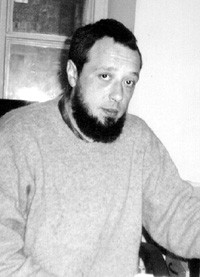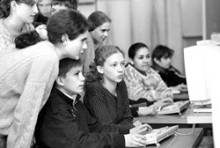Everybody needs foreign languages. In any case, many of us already feel the need to have at least a minimal command of one. And how many are those who, after paying handsome money for cassettes, private tutors, self-teaching textbooks, etc., have fallen short of their expectations to miraculously learn the language fast, had their hopes thwarted, and left convinced of their fundamental linguistic stupidity?
Potential or genuine bilinguals, i.e., teachers of English, alas, like many others of those who earn a living by their knowledge, are not always willing say what exactly those who want to learn to speak should do. We spoke with Ihor Manko, director of one of the most promising language schools in Kharkiv, about the methods which allow his school to keep the trust of students and maintain its level of teaching. In fact, speaking about such “specifics,” we tried to find the answer to the proverbial question of provincialism and Europeanness, and about how to overcome, at least on the subjective level, the cursed complex of our culture gap vis-И-vis Europe.
“Many people have been struggling with English for years, even decades, but still can only read a few lines and basically remain silent. This applies both to children in all kinds of foreign language gymnasiums and college students terrified at the prospect of taking an exam in English. What would you, a professional teacher and representative of the whole ‘language community’, advise and wish them?”
“I don’t quite agree to your assessment of the modern state of language teaching. Great changes have taken place recently both in school practice and in the attitude to this subject in personal consciousness. Foreign language is turning from the most hated into the most popular subject in school and university curricula.
“My advice is this: do not believe recipes of instant effortless learning (just like losing weight without going on a diet), but believe, instead, in your own capabilities. And, no matter when and how you learn a language, remember Aristotle’s prescription: to learn to play the harp, you have to play the harp.”
“How long has your school been open in Kharkiv, traditionally considered in the Soviet times an ‘almost metropolitan,’ but ‘completely un-European,’ city in Ukraine?”
“First, we do not call ourselves a school. In our culture, school is either a children’s educational institution or a research direction. Being neither, we call ourselves a center, the full name being the International House Language Center. The center combines very different processes, events, and people reduced to a certain common denominator, in our case, foreign languages. And, incidentally, what is going on in our center goes far outside the framework of school lessons, homework, and tests: we’ve got weekly interest- related clubs (drama, songs, video, spoken language, debates all in English, of course), exhibitions, soirees, and much more.
“Now to answer your question: the history of our organization dates back to the early 1990s. Do you remember the period of cooperatives? We were then called Streamline Linguistic Center after the title of the only accessible non-Soviet textbook of the time. We are proud to have been Kharkiv’s first non- governmental English-teaching institution which began, also for the first time, to teach a language exclusively on the basis of western resources. Then, in 1994 came a Soros Foundation grant. We felt as if we were Mark Twain’s pauper who woke up as a prince. It is then that I for the first time touched a computer and Xerox. No doubt, this changed everything immediately, from teaching resources to the expressions on the teachers’ faces. Our popularity in the city also jumped immediately, although we had always been in the leading group.
“By the way, concerning your remark about an ‘almost metropolitan’ and ‘totally non-European’ Kharkiv. This provocation almost hit home: I felt somewhat hurt on behalf of the city in which I had lived for twenty years (I came here from Poltava to study and could never leave). Counting to ten, I thought: of course, non-European! It is our provinces that are ‘European’, drowsy cities with age- old histories, which make you always think that history is the only thing you can be interested in. Kharkiv is, to use the customary cultural dichotomy, American: young (most of the district centers in the oblast are far older), dynamic, rather aggressive, and growing, not dying out. It was said in the Soviet times that there were two capitals of Ukraine: Kharkiv and Lviv. This is no longer true today, of course, for Kyiv has so much changed in the years of independence, but let us not forget Kharkiv was Ukraine’s (Soviet — Ed.) first capital. This may sound too passionate, but I never promised to be objective.”
“Are there many students in your school, and how are they coming along?”
“A lot of people come to us, for almost everybody needs English today. Let us leave the exact figure wrapped in a shroud of commercial secrecy (the more so that it may vary from moth to month) and say it means hundreds of those burning to catch up with what they missed, if we talk about adults, or not to let the chance slip, if we talk about children.”
“Are there ‘new people’ in your school, i.e., those who want to learn English not only for pragmatic purposes (‘I need it at work,’ as they put it) but also, so to speak, ‘for the love of literature’?”
“The trend is just the opposite: fewer and fewer people learn the language for the love of art. It is not easy to explain why: either life is becoming more and more pragmatic, the language is finding more practical applications, or general drop in the living standards is changing priorities. On the other hand, the level of linguistic preparedness is constantly growing, which can only make us pleased. It is now more interesting to work, and one can achieve more. In other words, the demand becomes more diversified. While earlier the overwhelming majority needed general English at the beginners’ level, today we are opening groups of professional and business English, as well as language-test preparatory groups. We are launching a French department and would like to try other languages as well.”
“How easily do they learn English of a higher, even business, level under nontraditional communicative methods?”
“Communicative methods are good because of their pragmatic approach to the language. In contrast to the deeply-respected academic university approach (I take my hat off to it), communicative methods is a phenomenon of the 1970s, almost revolutionary at the time. In addition to not using the native language (which was also practiced earlier in the audio-lingual method), we also force learners to speak English in the very first lessons, leaving them to communicate either by gestures or by exclamations. This produces almost a battlefield situation, but the methods works all right. In fact, now twenty years later one no longer feels the newness and revolutionary spirit of this approach. On the other hand, some former decisively rejected ways of teaching by what was supposed to be communicative methods are now staging a comeback and strike some orthodox communicative experts with their innovative spirit. So we only call our methods communicative by force of habit and also because we haven’t come up with a better term.
“The whole non-English-speaking world uses English as the language of communication without fearing of making mistakes or speaking with an accent. Far more deals are made in poor English than through the interpreter, for personal contact is more important than linguistic subtleties. Yet, having expressed my credo, I will admit one weakness: I am pleased to hear correct English speech with well- trained pronunciation, especially if you hear it from your pupils. Thus, purity of speech is accorded very great importance in the advanced groups.”
“Have there been cases when your pupils became teachers?”
“In 1996 we were admitted to the International House Organization with headquarters in London and schools (centers) on all the continents except Antarctica. (By the way, we were not the first in Ukraine: Kyiv and Lviv beat us.) To admit, one has to meet the criteria: no word of honor will do. In December 1995 an inspector came from London to look around and saw power outages, cold central heating radiators (some pipe burst at that time), candle-lit lessons, and everybody, including the teachers, wearing overcoats, in a word, a complete bouquet of the local sights.
“We had said goodbye to International House deep in our thoughts, when our most charming guest suddenly said she had never seen such self-sacrifice and thirst for knowledge in the conditions of a complete absence of basic conveniences of civilization, as well as such quality of work without a single foreign teacher. (Note: we now employ foreign teachers from Britain, the US, and Canada). Thus the story had a happy ending.
“But seriously, International House membership obliges us to do many things. Each teacher must do a methods-training course. Thanks to the Soros Foundation, this can be done in Kyiv for approximately one- fifth of what it costs in the West. A course like this has a serious impact on one’s idea of teaching and implies continuously making spoken demands in practical classes.
“The level achieved is constantly being improved: in-service training in Britain, seminars, conferences, the latest resource publications, etc. Top standards is a hard notion to define, but we can vouch for a good international level. The level of teaching is one of the basic items examined during regular inspections by our ‘bosses’ from London. They sit in on the lessons of each teacher, analyze them, and offer a list of binding recommendations.
“I can only answer the question about staff policy after explaining the specifics of International House membership. Professional requirements are so high that it is practically impossible to get a ready made teacher off the street, for such persons are scarce on Ukraine’s streets. This is why we have to nurture high- class teachers by ourselves, which we are constantly doing. This applies not only to Ukrainian but also to foreign teachers. This homegrown quality in the good sense of the word is most valuable: the collective accumulates all the experience gained, ensuring continuity and homogeneity (i.e., the opposite to the catch as catch can approach).”
“I heard your school occupies a splendid mansion.”
“It is pleasant and a little immodest to answer this. So I will just enumerate all this without comment: a detached building in downtown Kharkiv, an interior finished by Kharkiv’s best designers, modern office equipment, a library with the latest textbooks, video and English speaking satellite television in every classroom. What have I left out? Oh, yes, the Italian-made coat hangers always tumble down under the pressure of Ukrainian fur coats. But we are sure to find more reliable ones.”








